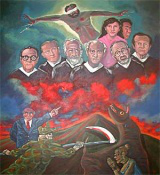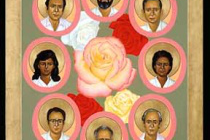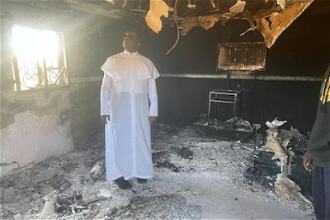Keeping the memory of the Jesuit Martyrs of El Salvador

artwork from University of Central America
I have just returned from an emotion-filled week of events in San Salvador, to mark the twentieth anniversary of the brutal killing of six great members of the Society of Jesus - all of whom I had known and worked with during the 1970s and 1980s. Our British contingent included Edinburgh's archbishop, Cardinal Keith O'Brien, SCIAF, CAFOD and Romero Trust representatives and a handful of Jesuits including former Provincial, Michael Campbell Johnston. In fact Jesuits from around the world, along with many thousands of lay people and religious from the Christian communities of Central America, came together to celebrate the martyrs' lives with a kind of 'grief-filled joy'.
The key memorial events began at dusk last Saturday, with a moving candle-lit procession round the University campus leading into a huge outdoor Mass, with more than 12,000 in attendance. The vigil went on till dawn in carnival atmosphere, with a concert of popular music and dance. For me, the culmination of the triduum of liturgies and exhibitions, seminars, broadcasts, films and song was a ceremony at the Presidential Palace on Monday morning which literally brought tears to my eyes when the six were posthumously honoured by President Mauricio Funes with El Salvador's highest award, the Order of José Matías Delgado - the equivalent of our 'Order of Merit'. I never would have believed this could happen. After twenty years of cover-up and denial by El Salvador's ruling establishment who had more in common with their assassins than with Romero or the Jesuits, this recognition of them as "eminent Salvadorans who rendered extraordinary service to the country", by El Salvador's first left of centre President, was astounding -especially as it was stated to be a "public act of atonement" for the stance of past governments. The speeches and the presentation of the medals to the families of the six and to their Jesuit brethren can be found on YouTube.
But going back to 1989: it had been at around 2am on 16 November, at the height of El Salvador's civil war, that those six Jesuit priests - Ignacio Ellacuria (59), Segundo Montes (56), Nacho Martin-Baro (44), Juan Ramon Moreno (56), Amando Lopez (51) and Joaquin Lopez y Lopez (71) - and their two women helpers, Julia Elba Ramos and her daughter Celina, were dragged from their beds in the residence of the Central American University and slaughtered by an army commando unit of the elite US trained Atlacatl Batallion. The action had been authorised from the High Command of the armed forces and was yet another in a long line of great atrocities that had marked Salvadoran national life, its people and Church, through a dozen years of repression and civil war.
Indeed almost a decade after the assassination at the altar of Archbishop Oscar Romero it brought another crop of martyrs, another cloud of witnesses. They were theologians and philosophers, writers and teachers, human rights activists who worked for justice, reconciliation and peace. They each had weekend pastoral commitments in service to Christian communities. They were all followers of Jesus Christ and striving to walk the same path as Archbishop Romero.
You could say they were killed for 'doing theology' the right way, incarnate in the struggle for survival of the Salvadoran people. They certainly paid the price for their fidelity to the rearticulated Jesuit charism of 'witnessing to faith and promoting social justice' just as the then Father General of the Society of Jesus, Pedro Arrupe, had warned his confreres would inevitably happen if Jesuits embraced the option for the poor so authentically in their lives and in their mission.
These six were all very different characters with quite distinctive personalities, each with their own special gifts and their own particular faults. But they lived in community and shared their joys and their fears, their jokes and their tensions in community; and they died in community - at the hands of soldiers and officers who literally blew their brains out because as a group they were absurdly labelled as 'the brains behind the guerrilla movements'. The military intruders shot too at their dangerous theology books and one volume fell off the shelf into the blood of Juan Ramon Moreno. With spectacular and uncanny symbolism it was Jürgen Moltmann's 'The Crucified God'. They also fired a flame-thrower at a photographic portrait of Archbishop Romero hanging in the hallway. It had been taken and printed by Chilean photographer, Carlos Reyes, and I had carried it out to San Salvador as hand luggage five years earlier with the assistance of the then General Secretary of the Bishops' Conference, Mgr Vincent Nichols.
This celebration of martyrdom was not simply a nostalgic reminiscence of a long-gone epoch. Those Jesuit martyrs, like Archbishop Romero, and like the four US religious women raped and murdered there 30 years ago, offer to us, today, paradigm examples of living love and transforming solidarity and of heroic commitment to reconciliation and peace. They stand for life over death, for courage, creativity and dogged determination in working for the kingdom of God. The martyrs energise us. For Christians truly authentic remembering must be 'Do this in Memory of Me' and so the task once again is to carry on the work and mission for which these men and women gave their lives.
In short the martyrs of Central America give us real hope as we struggle, on the one hand, to work for justice and peace in our greedy and materialistic world where the lives of the poor are so cheap; and, on the other, as we strive to witness to our faith in this sceptical and sometimes hostile post-modern world. The challenge is whether, and most importantly how, we hold the two together with integrity as these six Jesuits did - and not fall into the temptation of keeping the two in separate compartments of our lives, in effect becoming schizophrenic 'Nicodemus Christians' of the 21st century!
Julian Filochowski
See also:
www.thinkingfaith.org/articles/20091116_1.htm and
Michael Campbell Johnston SJ 'Very Ordinary Saints', The Tablet, 14 November 2009



















